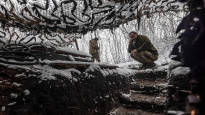President of France Emmanuel Macron broke an unexpected political news in Paris on Tuesday. Macron said that nothing should be ruled out in terms of supporting Ukraine, including sending ground troops to Ukraine.
You can find reasons for the idea.
According to Macron and the NATO countries, the West must support Ukraine so that Russia does not win the war.
Macron’s second argument is also good: Until now, there have been many things that many people think should never have been done, and they were done anyway. According to some, the fighters should not have been given up, and neither should the tanks. Now, what is excluded from many is the sending of troops.
But the idea also carries huge risks.
1. Fighting in Ukraine would be life-threatening and expensive
Sending ground troops would be a matter of costs of a different category than the West’s support for Ukraine until now.
According to the President of Ukraine, 31,000 Ukrainian soldiers have fallen. Losses and damage would also be known to possible western troops.
Sending and protecting an international force would also increase the financial costs enormously, as the force would need maintenance and support measures.
It could be difficult to find a large coalition of Western countries that would send troops, because the arms aid has also stalled. Handing over weapons has been held back partly because replacement material is expensive or unavailable. Frontline countries, on the other hand, do not hand over weapons that they might need themselves. Handing over highly effective weapons has been delayed because it might irritate Russia.
Overall, the West has handed over weapons less and more slowly than Ukraine hopes, and Ukraine has not been able to regain the territories it has lost.
France is not the leader of the West when it comes to handing over weapons. It is far behind Germany, the Baltics and the Nordic countries. Now, however, Macron seemed to bring up the idea that in addition to weapons, there might be a need to send people as well. It is not known what kind of troops Macron means.
2. Macron also puts his own position on the line
After the meeting, Macron said there was no consensus on sending troops.
It is unclear whether anyone at the meeting supported Macron’s idea.
The leaders of about 25 countries participated in the meeting called by Macron in Paris. They described the discussion as an open consideration of military and non-military options.
President Sauli Niinistö said in his e-mail statement to that “there was a widely shared perception that there would be no military presence”. According to Niinistö, this was also Finland’s position.
The German Chancellor said the same Olaf Scholz: “It has been agreed from the beginning and it is still valid that EU or NATO countries will not send ground troops or soldiers to Ukrainian soil.”
The French opposition is of Le Monde magazine harshly criticized Macron’s idea and accused him, among other things, of leading France to war with Russia and endangering the existence of the French people. Macron’s party, on the other hand, accused the main opposition party of fraternizing with the Russians.
3. War between NATO and Russia is taboo
The war between NATO and Russia is something that is hardly talked about.
The West wants to avoid the forces of Russia and NATO countries coming into conflict. If the war accidentally or intentionally expands, the escalation may be impossible to stop.
However, during the Russian war of aggression, the understanding of what leads to escalation has varied. The West feared that handing over fighter jets, battle tanks, and long-range weapons would potentially lead to Russia interpreting it as excessive Western involvement in the war and expanding the war elsewhere.
However, decisions have been made to hand over fighter jets to Ukraine, for example in Poland and Denmark, and the West has jointly given wagons. Long-range missiles have also been given.
It is relative what it means to send ground troops to Ukraine. Britain has, for example, trainers of medical personnel in the country, but it does not plan to send troops to Ukraine on a “larger scale”.
Former Secretary General of NATO Anders Rasmussen pointed out in the summer of 2023 that some countries, such as Poland, might support Ukraine with troops if the country is not promised a route to NATO. Today, Polish Prime Minister Donald Tusk said that Poland is not planning to send troops to Ukraine.
In Finland in 2022, the then chairman of the parliament’s foreign affairs committee Jussi Halla-aho told Helsingin Sanomat that he believes that military intervention by the West is inevitable before long, so it would be better to do it sooner rather than later. He later regretted his statement.
President Sauli Niinistö, on the other hand, spoke in the fall about the risk of escalation in general, for example due to damage caused in war. He reminded that at worst it could lead to a world war.
